If you’re thinking about opening an online store or operating one already, chances are you’ve heard of Shopify–and maybe even considered it your platform of choice, but you may be wondering, “Is Shopify legit?”
One of the most vital aspects of running a successful online business is selecting the right technology to meet your needs. But at the same time, there’s so much information available online that it can be hard to find clear-cut answers regarding which platform is truly “legit” and reliable for operating an ecommerce storefront.
Here at Ecommerce CEO, we’ve written a ton of content about the Shopify platform and store builder to help people who want to use it as the foundation of their online business. So, we’ll skip the basics of signing up for an account and setting up your store.
In this article, we’ll look closely at Shopify’s legitimacy – covering company history and payment security. We’ll look at the scams to watch out for, and how to report any scams you see directly to Shopify.
Is Shopify Legit?

Company History
Shopify, a renowned global ecommerce platform, was founded in 2004 by Tobias Lütke, Daniel Weinand, and Scott Lake of Ottawa, Canada. Shopify set out to create an all-encompassing solution for small businesses worldwide to manage their day-to-day operations.
Shopify has experienced exponential growth over the last decade, expanding into more than 175 countries and becoming one of Canada’s most successful online companies. It’s known for its ease of use, especially for people who want to build an ecommerce website without knowing any code.
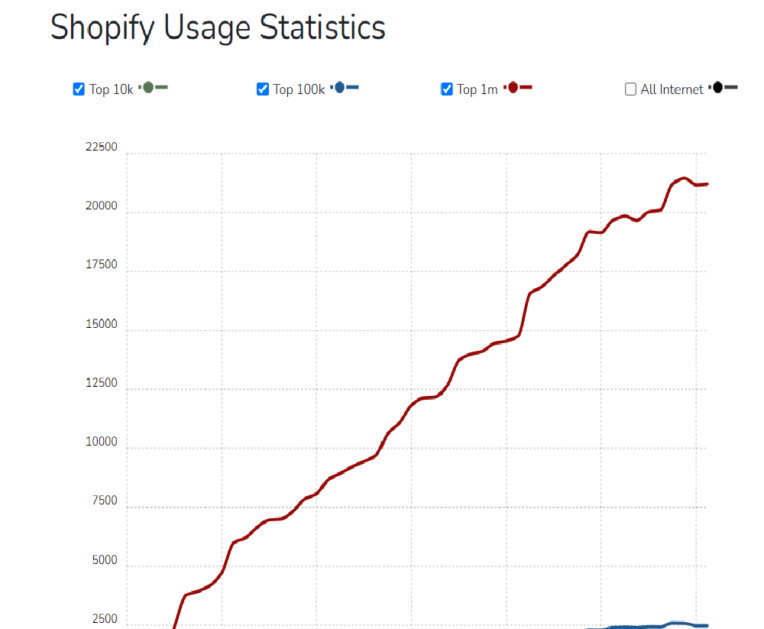
According to BuiltWith, it currently powers over 4 million ecommerce businesses. The user-friendly interface makes it a great platform for beginner merchants, especially because you can host unlimited products regardless of your chosen pricing plan.
Check out our Shopify review and some tutorials to learn more about whether it is the right platform for you.
Other Shopify Products and Services
Beyond the commerce platform, Shopify has grown to offer Shopify Capital and the Shopify Fulfillment Network. They also offer a point of sale (POS) system for brick-and-mortar businesses and pop-up shops.
Shopify Capital

Shopify Capital is an innovative financing option for ecommerce business owners. It provides unsecured cash advances of up to $500,000 based on past sales performance from your Shopify account. You pay the loan back through a percentage of your daily sales.
Business owners can use the funds however they see fit – marketing, expanding inventory, and more – so merchants can grow their business in whatever direction they choose.
Shopify Fulfillment Network

Shopify Fulfillment Network (SFN) is an innovative service offering from Shopify that provides businesses with simplified and cost-effective order fulfillment.
In a nutshell, SFN helps merchants easily manage warehousing and fulfillment operations – removing the need to handle these operations in-house or outsource them to a third party.
By using SFN, merchants can take complete control over their supply chain by allowing them to store inventory in multiple locations and handle shipping automatically. This saves time and money while speeding up delivery and improving customer service. Additionally, SFN integrates seamlessly with Shopify’s ecommerce platform, powering merchant websites and enabling business owners to manage their fulfillment operations from one interface.
Payment Security
Shopify is dedicated to keeping your payment data secure with its lightning-fast servers, PCI Level 1 encryption protocols, and two-factor authentication. With Shopify’s stringent security measures, you can be sure that your transactions are secure from fraud or any other risks.
Shopify uses leading payment gateway providers, including Stripe, and PayPal, to process payments securely on their platform and offers advanced anti-fraud tools to keep financial information safe. They also have Shopify Payments, which helps ecommerce store owners save on transaction fees.
Apps and Add-Ons
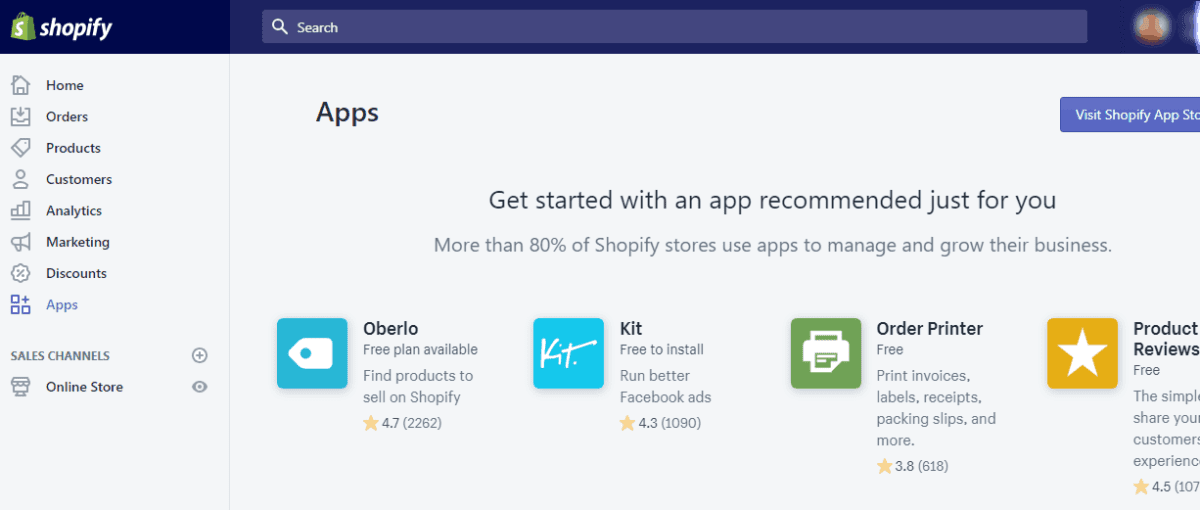
The Shopify App Store is a huge app marketplace that allows you to connect other services to your store. While some of these apps are free, many come with an additional monthly fee. Depending on your needs, you could spend hundreds of dollars a month (in addition to your base Shopify subscription fees) to get your store up and running the way you want it to.
Often, these fees aren’t paid directly to Shopify – they’re paid to the third-party app you’re using.
For instance, if you use Mailchimp for email marketing and need to upgrade from the free plan, you’ll be able to use the Shopify app for free. However, you’ll still have to pay for the Mailchimp subscription plan.
If you run a dropshipping business, Shopify is often considered the best ecommerce platform simply because of how many supplier apps there are to integrate with.
Some may feel this is a “scam,” but it’s a common business model, especially in the ecommerce platform space. These apps essentially act as plugins to add more functionality to your ecommerce site.
BigCommerce, a major Shopify competitor, has a similar marketplace-type setup. The key to saving money here is to purchase the Shopify plan with the most features you need without relying on those add-ons to make up the difference in price.
In addition to the Apps marketplace, Shopify and other major platforms also offer premium website templates. These optional additional purchases give you the freedom and flexibility to further customize the appearance of your store.
You do not have to use a premium theme, as free themes are available to get you started. However, making your store stand out can be hard since many others build on those same Shopify themes.
Are Shopify Websites Legit?
Yes – but fraudsters are everywhere, so scams exist. This is true of nearly every kind of website out there – not a Shopify-specific problem.
Scams to Watch For
These scams aren’t unique to Shopify but are the most common ones you’ll encounter as you shop with merchants.
Shopify Store Duplicator Schemes
The duplicator scheme is a type of scam that involves scammers creating fake stores with similar domain names to existing Shopify stores in order to sell identical products.
Mike Lindell’s MyPillow store was one example of this, with a duplicate store registered under the domain name mypillowstore.com.
To combat this issue, Shopify took down the fake storefront and introduced extra software tools and teams dedicated to finding and eliminating these fraudulent sites.
Triangulation Schemes
The triangulation scheme is a clever and enduring fraud activity used on Shopify and other ecommerce platforms, as it is one of the more profitable scams.
It involves a scammer setting up a fake Shopify store, marketing it as legitimate using SEO, social media, and other methods, then buying products from suppliers with stolen credit cards.
When the cards are rejected, the credit card company initiates a chargeback on Shopify – resulting in the scammer losing both the money and the product.
Fake Return Ticket
In this situation, the buyer purchases goods once but then decides to purchase another similar but cheaper product. Then, they submit a return request for the first, more expensive product, stating that something was wrong like it didn’t match the description.
When they send the return, it’s actually for that second, similar but cheaper product. They get a refund for the higher amount and the better product, too!
Direct Client Scheme
This scheme requires playing the long game – the initial purchase goes well. Then, when the buyer comes back for another order, the seller suggests bypassing the “hassle” of Shopify and suggests a direct credit card payment.
Once they have the buyer’s full credit card information, they use it to drain funds, and no goods are received on the second order.
Switching Scheme
In a switching scheme, a buyer makes a purchase from your Shopify store, then claims they have technical issues with getting the payment to go through with Shopify Checkout.
They’ll ask you to send a PayPal invoice directly to them to circumvent these issues.
When you do, you’ll receive a notification that looks like it came from PayPal. It says the payment has been made, and the buyer is waiting for a tracking number to indicate that you’ve shipped the product.
The PayPal “funds” are on hold until you provide the tracking number.
People who fall for this scam give the “customer” a free product since there was never any money on hold with PayPal. If this happens with an expensive product, sellers can lose a lot of cash.
It’s worth mentioning that this scam isn’t exclusive to Shopify and even predates its existence. It’s common on eBay and has trickled over to Shopify and other ecommerce platforms.
Fake Purchase Orders
This rare scheme requires the most technical skill to execute, but it’s still out there. A scammer, acting as a customer, creates a copy of the seller’s Shopify checkout sheet on their cloud drive, then alters the submit button link.
Using code, they connect it to software, allowing them to save all the data from the checkout process.
Once that’s complete, they’ll adjust the data they received, then send the fake checkout sheet back at a lower price. Without knowing it’s altered, you won’t know the difference and approve the transaction.
This scam lets people get products without the seller’s consent, or in the case of consent, at a lower price. Before the seller realizes what’s happened, they can lose a lot of money.
And if the scammer doesn’t successfully alter the purchase order sheet, they can ask the bank for a chargeback, which still costs the seller money.
If you suspect a store on Shopify might be a scam, it’s important to report it to Shopify support right away.
To report an issue, visit the Shopify homepage, then click “Legal” in the footer menu.
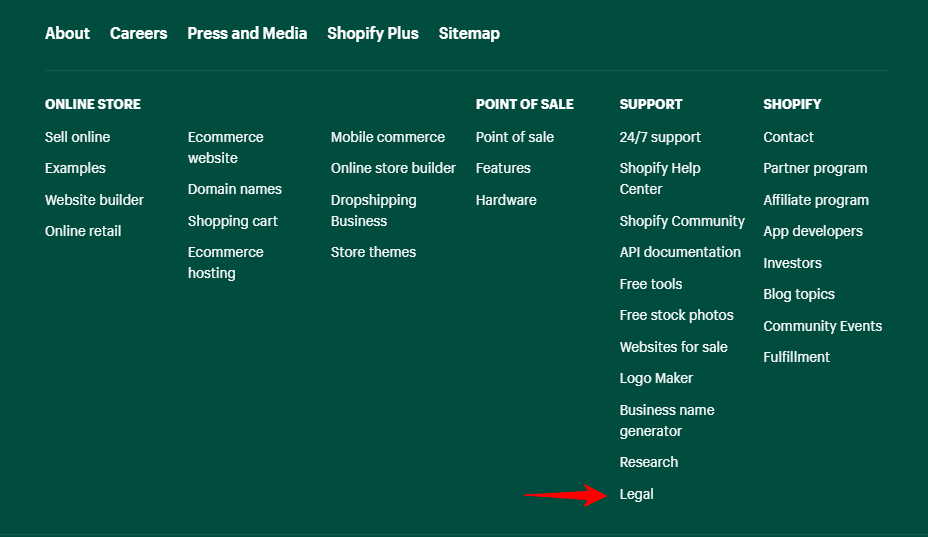
On that page, scroll until you see “Acceptable Use Policy” and click “Report an issue with a merchant.”
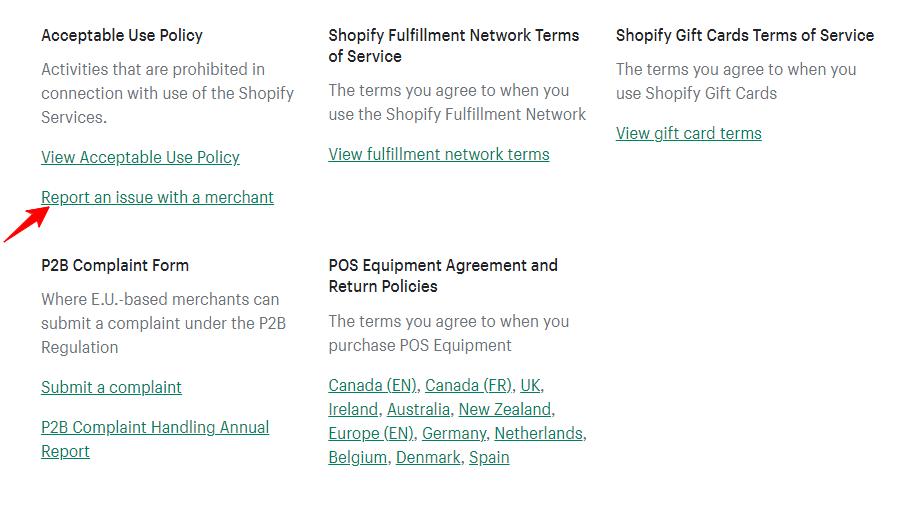
From there, you’ll be able to choose the issue from a dropdown menu and fill out a form with details.
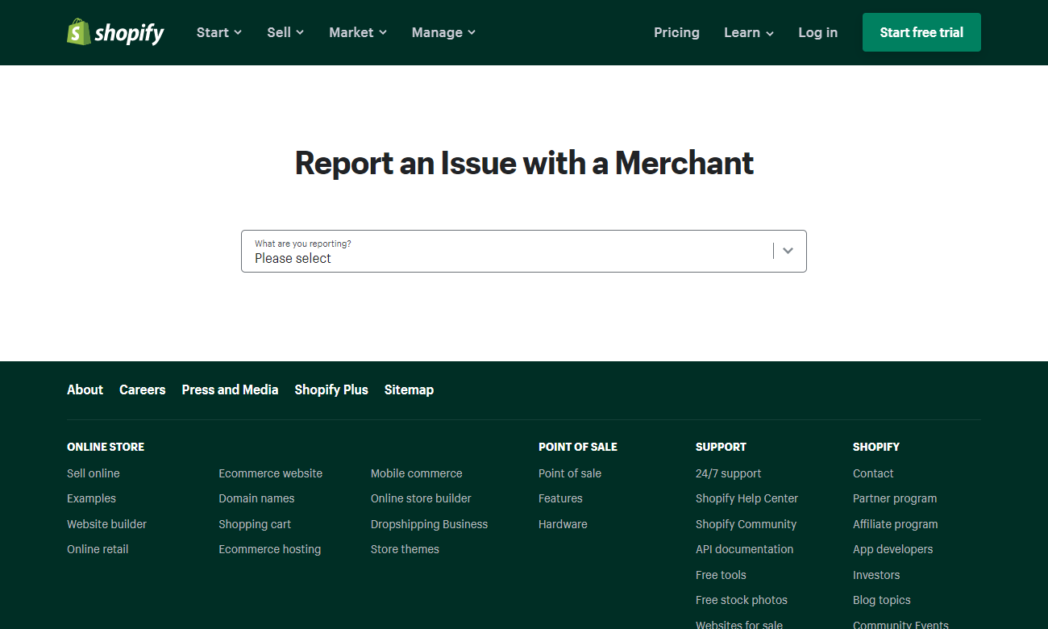
This will alert Shopify of any suspicious activity related to the store in question and prompt them to take necessary steps. You can also contact Shopify directly with any questions or concerns about an individual store by visiting their website or calling their support line.
Reporting scam stores helps protect everyone, so make sure to do your part in keeping Shopify safe.
FAQs
Shopify is a Legit Ecommerce Platform for Your Online Store
The moral of this story is that Shopify is a legitimate ecommerce platform, but some Shopify stores on the platform are not.
As an ecommerce business owner, you can ensure your shop is one of the legitimate ones. As an online shopper, you’ll need to do some due diligence to ensure you’re shopping with a trusted shop.
